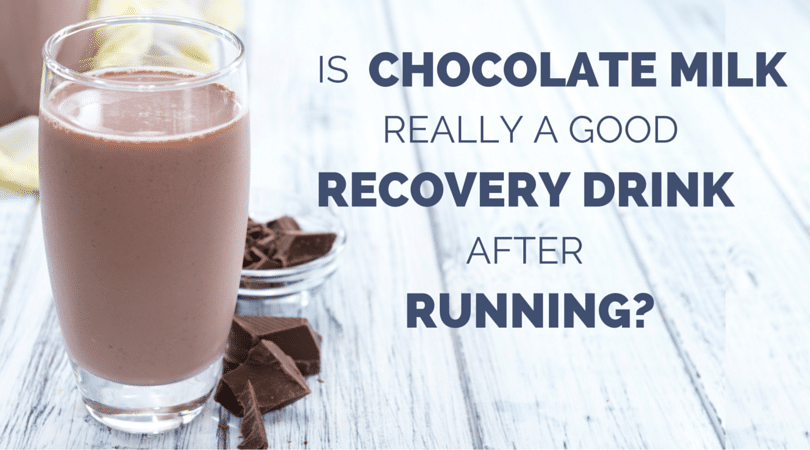Multiple research studies have been highlighted recently touting the power of chocolate milk as a post exercise recovery aid and one of the best foods to eat after running.
The claims are that chocolate milk (or any flavored milk) contains the perfect ratio of carbohydrate to protein (between 3:1 to 4:1) to hasten recover after intense exercise. It helps replace fluids and electrolytes lost during exercise, it contains key nutrients for health such as calcium and vitamin D, and it is relatively inexpensive when compared to the engineered sports beverages on the market today.
But, are these claims true?
Is chocolate milk after a run really the best drink for muscle recovery and how does it compare to much more expensive recovery drinks on the market?
Let’s find out

What Does the Research Say About Chocolate Milk For Recovery?
As you may recall, the purpose of post-workout recovery is to replenish glycogen (sugar) stores in the muscle and start the process of protein synthesis (muscle rebuilding) so that your body is ready for the next workout.
One particular research study (Chocolate milk as a post-exercise recovery aid.) compared chocolate milk to a fluid replacement drink (Gatorade) and a carbohydrate replacement drink (Endurox R4) to measure each drink’s effect on recovery and subsequent endurance performance.
In this study, trained endurance cyclist completed a glycogen-depleting bout of exercise.
Immediately following the exercise and 2 hours later they consumed equal amounts of Gatorade, Endurox, or chocolate milk (each participant was tested using each product on three separate days).
They recovered for 4 hours and then exercised to exhaustion.
Researchers measured each cyclists’ time to exhaustion, average heart rate, perceived exertion, and total work.
This is interesting:
Results of this study suggested that chocolate milk out-performed the Endurox in measures of time to exhaustion and total work.
It was thus concluded that chocolate milk is just as effective, if not more effective, of a recovery drink than specialty sports beverages with an identical nutrition profile.
It should be noted that this is one of just a handful of studies and that this particular study was funded in part by the dairy industry, which is not uncommon in nutrition research and does not necessarily negate the results.
Nevertheless, the purpose of this post is not to dive deep into the research and come up with a recommendation for the absolute perfect recovery drink for every runner.
It is also not to promote any one product over another.
At the end of the day, each individual will have their personal preference for what product they want to use and like best.
Rather, my intention is to show how different foods and supplements can produce the same results and to provide you with the information that can help you make the best choice for yourself.
How To Find the Best Recovery Drink for You
An ideal recovery drink will have between a 3:1 and 4:1 carbohydrate to protein ratio.
It does not matter if you make a homemade recovery drink, use chocolate milk as a recovery drink, or any other store bought product from GNC or other health stores, as long as your drink has the ratio of carbohydrates to proteins.
The carbohydrate should be an adequate amount to refill glycogen stores and should enter the bloodstream quickly for optimal storage.
The protein should contain many, if not all, of the essential amino acids necessary to stop muscle breakdown and begin muscle repair.
Finally, the beverage should adequately replace the fluids and electrolytes lost during exercise while being acceptable in taste and digestion.
If your drink does not contain the electrolytes, you need to consider other ways to get your electrolytes in.
RunnersConnect Bonus
Download our FREE recovery foods guide, with the top 10 foods for each of the essential recovery vitamins, minerals and macro nutrients. Plus a sample 1-day meal plan!
Chocolate Milk vs. Alternative Recovery Drinks
1% Chocolate Milk (12 ounce serving)Endurox R4 Chocolate (2 scoops in 12 ounces water)
| Calories | 255 | 270 |
| Fat | 4 g | 1.5 g |
| Carbohydrate | 42 g | 52 |
| Protein | 12 | 13 |
| Sodium | 345 mg | 210 mg |
| Potassium | 570 mg | 190 mg |
| Calcium | 45% DV | 20% DV |
| Vitamin D | 38% DV | 0% V |
| Avg. Cost per 12 oz serving | $0.47 | $1.60 |
Looking at the comparison above you can appreciate why there is such a buzz surrounding chocolate milk.
- Chocolate milk is not magic, but research has shown that it performs as well, or better than, specially engineered products that have a similar nutrition profile.
- It is rich in key nutrients like calcium and vitamin D, which play an important role in bone health and are often lacking in a runner’s diet.
- Chocolate milk weighs in at a 1/3 of the cost of most sports products.
And that doesn’t even take into account that it tastes good!
I have nothing against specially designed sports products and I think they play an important role in endurance sports, especially those that require fueling during competition.
Some drawbacks to chocolate milk include:
- It has a short shelf life (it is prone to spoiling and needs to be kept cold)
- It isn’t as portable as powders are for storage and later use
- A large percentage of athletes report difficulties in digesting milk and milk products. It should be noted that flavored soymilk is an equally effective product, but tends to cost a little more than cow’s milk.
Should I Drink Chocolate Milk as a Recovery Drink?
The final decision on which products you use is up to you.
Here’s the deal:
When I create nutrition plans for my clients, I will often choose to use whole foods such as chocolate milk instead of specially engineered sports products.
The reason for this is two-fold:
- It keeps cost in mind because athletes tend to need more calories and more food than the standard person. More food means more money so any place you can cut costs without sacrificing nutrition is a good thing to focus on.
- The further away we get from “real” foods, the more complicated our diets become. I don’t like when I see diets in which the majority of calories and nutrients come from powders and pills. No powder or pill can replicate the array of vitamins, nutrients, fiber and phytochemicals we get from eating a variety of whole foods.
Simple is best and an optimal sports nutrition diet can be achieved without the use of supplements or specially engineered foods.
However, the choice is yours. No matter what product you select just be sure that it is safe, well tolerated by your body, and is something that you enjoy.





21 Responses
You almost lost me here…
“this particular study was funded in part by the dairy industry.”
I found this interesting too…
“I feel that the further away we get from “real” foods, the more complicated our diets become.”
I don’t think things like high fructose corn syrup, polysorbate 80, carrageenan, cellulose gum, guar gum, artificial colors or flavors qualify as “real” foods.
My preference is a ProBar, 100% vegan, 70% raw, non-GMO and ingredients recognizable as real food. I follow that up with a protein smoothie I make myself with stuff that grew on plants including berries, bananas, chia seeds, flax seed, greens, hemp/rice/pea protein blend, an organic, vegan friendly EFA blend and water.
Hi James, thank you for your comments. I just wanted to clarify that the purpose of this blog was simply to explain why there has been so much hype surrounding chocolate milk as a recovery drink and highlight the comparisons that have been made between chocolate milk and specially engineered sports drinks that have a similar macronutrient profile, such as Endurox. There is a vast array of recovery products that athletes use but this research was focused specifically on beverages containing carbohydrate and protein. I agree that most brands of chocolate milk are too heavily processed and high fructose corn syrup and color/flavor additives are things that we would like to avoid when we can. When I said “real” foods I was referring to foods that the average person/runner would be familiar with and maybe already have in their household. I certainly appreciate the wide variety of options that a runner has to fuel their bodies and I am not suggesting that any one option is the best. I will admit that some choices are definitely healthier than others, but there are other factors that sometimes need to be considered. Chocolate milk is simple to prepare, has a flavor that is accepted by most people, and is relatively inexpensive so it is a good recovery food option for runners who need to consider cost and possibly what other members of their family may also enjoy! As for the funding disclosure associated with these studies: it is not uncommon for nutrition (or pharmaceutical or medical) studies the have their funding come from a specific industry. While the results of this study came out in favor of the supporting industry, that is not always the case. However, it does have to make us a little leery of the results and we should look to future research to confirm the findings for us. Thanks again for your input!
Thank for the information. I do like chocolate milk, but don’t like the added sugar/corn syrup. I’d like to see the comparison to regular milk.
Thanks for your comment. The reason the comparison is with chocolate milk is because the added sugar in chocolate milk gives it that 3:1 to 4:1 ratio of carbohydrates to protein. Regular milk only has a ratio of about 1.5:1. You are right, the added high fructose corn syrup is not very attractive in any food. If you like regular milk, you could drink 8-16 ounces of that after a hard workout and add a couple pieces of fruit, 1-2 cups of cereal, or even a baked potato to get the extra carbohydrates your body needs to refill its glycogen stores.
And pure milk is much cheaper..
If I end my run at home, I get out the nonfat milk, pour a glass, squirt in chocolate syrup, mix, and I have chocolate milk with minimal fat. That might not have the same amount of sugar to make it 4:1 carbs:protein, so I would add a banana. If my run is away from home, I’ve also pulled into a gas station and purchased 1% fat Nesquik chocolate milk for @ $1.50 – $2.
Any idea how the amount of fat in the drink affects the benefits of a recovery drink?
What if I made chocolate milk with whole milk? Does the presence of more fat inhibit the benefits the 4:1 carb/protein ratio offers?
Thanks for your question Chris. It has been suggested that perhaps the higher fat content of 2% or whole chocolate milk actually makes chocolate milk a better recovery drink. However, this hasn’t yet been investigated. The current recommendation is to drink skim or low fat (1%) milk, whether it is plain or flavored. The extra fat in whole milk is mostly saturated fat, which offers nothing to us nutritionally and is associated with negative health risks when consumed in higher amounts. I realize that some people don’t like skim milk so I would suggest trying 1% and seeing if that satisfies your tastes.
How about chocolate coconut milk?
Coconut milk isn’t nutritionally the same as cow’s milk in terms of carbohydrate content and protein, the two important things for recovery. On average, 1 cup of chocolate milk has about 30 grams of carbohydrate and 8 grams of protein. One cup of chocolate coconut milk only has about 12 grams of carbohydrate and 1 gram of protein so it won’t do much in helping you recovery from a workout besides aiding in rehydration. Furthermore, coconut milk has about 4 grams of saturated fat per cup, which is a type of fat we would like to reduce in the diet.
coconut milk is very oily and from coconut milk you can use when you cook curry like chicken curry,if you eat to much coco milk im sure you run to the toilet.coconut oil is good also to use wwhen you go sun bathing in the beach it makes you brown quickly.if you like to ask something about coconut milk email me and answer your email to me emily.thnaks for your blog about chocolate milk im now have idea what to do about drinking chocolate milk i will share this infomation to all my cousins and my nephews……..
How about Almond Milk?? I tend to drink because of the reduced calories, free of cholesterol/saturated fat, and is naturally lactose free. I add a half scoop of protein powder for a little extra protein boost.
Nice article. I’m a runner and my question is, when exactly is better to have a glass of chocolate milk? I mean, how long after a run in order to achieve the best out of it? Thanks
Thanks for reading and for your comment. The short answer to your question is- as soon as possible. The harder and longer the workout, the more important recovery becomes. Also, the sooner your next work out is, the more important it is to recover quickly. A general rule of thumb is to get some carbohydrate in within about 30 minutes after completing an intense exercise session. Chocolate milk is good because it is quick and easy (liquids are usually better tolerated following hard exercise). Once you get home and have a chance to get settled you can have a more well-rounded meal to finish up replacing glycogen.
Great question. 30-60 minutes is optimal. https://runnersconnect.net/running-nutrition-articles/what-is-good-to-eat-after-a-run/
What an interesting and useful post! Thank you Emily!
Q. Is there a benefit to either syrup or chocolate milk powder? I like the idea of real auger in the powders…
What about ovaltine?
i believe now that chocolate is good for health im happy that i think about to check in google cause im really interested what can we get in drinking choco milk or eaitng chocolate.i think about to plant more cacao in the farm of mygrandmother when imback home this month.cacao is the plant that you can make choco milk.cheryl pink=philippines
I was at the NSCAA soccer coaching convention in Philly. I obtained a flyer from Nesquik about Recovery is Essential after hard workouts.
I would like to pass this information onto my soccer coaches at our March 22, 2014 Coaches Convention. Is there a way to obtain the flyers so that I may pass on the information?
If you are not the correct person to request this information, could you please direct me to the proper person.
Thank you.
How about the fact that chocolate inhibits the absorption of calcium in milk by the body? Wouldn’t strawberry flavored milk be a better alternative? Many grocery stores sell strawberry syrup that can be added to whole or skim milk.
Hi Cathy, thanks for your input. As the focus of this post is about recovery from a hard workout, with protein and carb replacement being the number one priority, we still recommend chocolate milk due to the ease of use post workout as it is already together. We are hoping runners know the importance of taking calcium with other meals. Good recommendation with the strawberry though, if it works for you, keep it up!